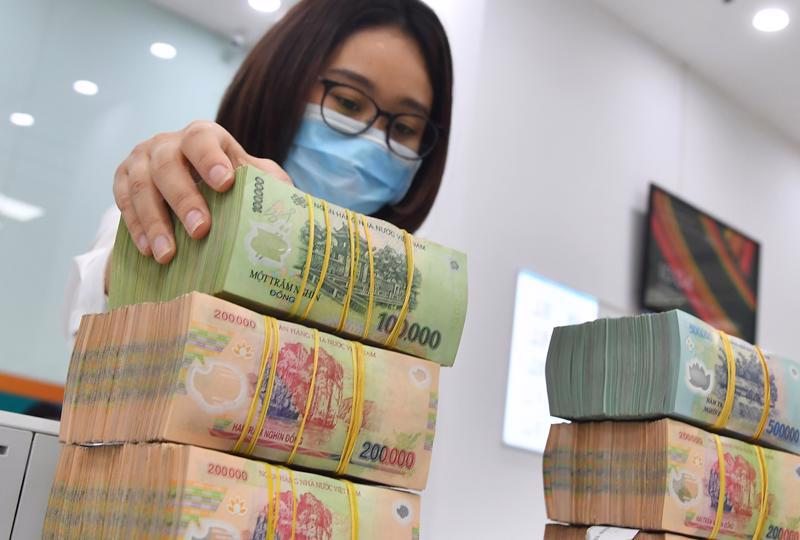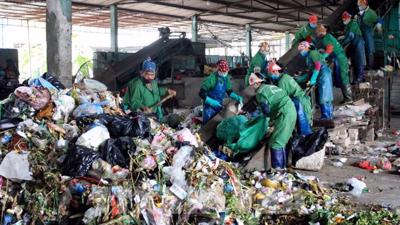Inflation under control
All possible levers are being discussed as Vietnam grapples with the specter of rising inflation in the opening months of the year.

The General Statistics Office (GSO) has reported that the Consumer Price Index (CPI) for May rose 0.05 per cent against April. Compared to the December figure, the May CPI was 1.24 per cent higher and also up 4.44 per cent year-on-year. This represents the highest annual increase since January 2023. The CPI in the first five months of 2024, meanwhile, increased 4.03 per cent compared to the same period last year.
Factors in effect
Largely behind the CPI increase in May, according to the GSO, was a rise in pork prices stemming from a supply shortage following an outbreak of African swine fever at the end of last year, together with higher household electricity prices.
Seven groups of goods and services posted rising prices in May compared to April, while three groups posted declining prices and one group posted stable prices. Of the seven, food and beverage services saw the highest increase, of 0.38 per cent, which contributed 0.13 percentage points to the increase in overall CPI. Within this group, food prices rose 0.59 per cent and dining out 0.14 per cent.
The housing and construction materials group also rose, by 0.38 per cent, mainly due to a 2.11 per cent increase in household electricity prices, a 0.28 per cent rise in material prices, and growth of 0.23 per cent in rental prices. The culture, entertainment, and tourism group increased 0.31 per cent, with packaged tour services up 1.12 per cent and guesthouse and hotel tariffs 0.28 per cent due to greater travel demand during the April 30 - May 1 extended holiday.
Figures from the GSO put the total retail sales of goods and revenue from consumer services in May down a slight 0.1 per cent against April, due to lower consumer demand and travel following the extended holiday. However, compared to the same period last year, these rose 9.5 per cent on the back of a major contribution from the tourism industry. Overall, in the first five months of 2024, total retail sales of goods and revenue from consumer services increased 8.7 per cent year-on-year. Revenue from accommodation and dining services was up by 15.1 per cent and outbound tourism by 45.1 per cent.
The total retail sales of goods and revenue from consumer services in May are projected to reach VND519.8 trillion ($20.35 billion), marking a 9.5 per cent rise year-on-year. Specifically, food and foodstuffs are up 9.9 per cent, utensils, tools, and household appliances by 9 per cent, clothing by 9.3 per cent, accommodation and food services by 17 per cent, and travel services by a notable 34.3 per cent.
In the opening five months, the total retail sales of goods and revenue from consumer services, at current prices, are expected to hit VND2,580.2 trillion ($101.18 billion), reflecting an 8.7 per cent increase against the previous year. Retail sales of goods during the period were estimated at VND1,998.2 trillion ($78.40 billion), comprising 77.5 per cent of the total and up 7.4 per cent compared to the same period last year.
Pressure on prices
A report from the GSO has core inflation in May rising 0.15 per cent compared to April and 2.68 per cent year-on-year. In the first five months, core inflation increased 2.78 per cent compared to the same period of 2023, which is below the overall CPI increase of 4.03 per cent. The gap is primarily due to factors like food costs, fuel prices, education, and healthcare services, which are excluded from basic inflation calculations.
The National Assembly (NA) has set a target for 2024 of controlling inflation at between 4 and 4.5 per cent. However, average CPI in the first five months has already surpassed 4 per cent. In a recent report presented during an NA meeting, the Ministry of Planning and Investment (MPI) noted that average CPI growth has nearly reached the target set by the legislature, and this scenario is generating inflationary pressure and posing latent risk to the existing economic landscape.
According to the MPI, inflationary pressure is being driven by external factors such as oil price fluctuations and costs for food, semiconductor materials, and global sea and air transportation, which impact upon domestic prices for petroleum, raw materials, and transportation. Internal factors, meanwhile, include rising electricity rates, education and healthcare costs, and the introduction of wage reform policies.
The Ministry of Finance has highlighted several factors that are expected to influence price dynamics over the remainder of 2024. These include the anticipated continuation of unpredictable trends in essential commodity prices, such as oil. Projections suggest that the average Brent crude oil price will fluctuate between $80 and $90 a barrel over the course of the second half of the year.
Furthermore, global raw material prices remain high amid complex global economic and political circumstances. Given Vietnam’s significant reliance on imported raw materials for manufacturing, fluctuations in global commodity prices are certain to impact production costs, thereby exerting pressure on domestic consumer goods prices. The rising USD exchange rate will also increase import costs for raw materials, further compounding pressure on domestic prices.
Seeking control
During discussions over the escalating inflationary pressure, conducted at the seventh session of the 15th NA, its Economic Committee raised the alarm about inflation. Mr. Hoang Van Cuong from the Hanoi delegation observed that inflationary pressure is substantial in 2024. Unlike previous periods, where external factors drove inflation, the pressure is internal this year.
“During the first quarter, the CPI stood at 3.77 per cent, and in April it surpassed March,” he said. “Traditionally, the first quarter always experiences a CPI increase due to the Lunar New Year (Tet) festivities, but by March and April prices typically decline. This year, however, April’s CPI exceeded all forecasts. This indicates a genuine upwards CPI trend.”
Meanwhile, global oil prices show no signs of easing, leading to sustained high domestic oil prices. Domestic electricity costs are also expected to head upwards due to Vietnam’s strong push towards clean and renewable energy sources, which come with high input expenses. These are tangible factors that will fuel price hikes during 2024.
Suggestions have therefore been put to the government about effectively managing and ensuring sufficient supply at stable prices, particularly for crucial inflation-sensitive categories like food, grains, and oil. There have also been calls for policies that incentivize and empower businesses to invest in actively producing the raw materials they need, to enhance economic self-reliance and autonomy.
To manage inflation, some have sought adaptability in monetary policies. It has been suggested that lending rates be maintained at a reasonable level, with deposit rates exceeding the projected inflation rate, specifically at around 5-6 per cent per annum. While there is caution about elevating lending rates to as high as the previous 10 per cent, stabilizing them at approximately 7-8 per cent per annum would likely be acceptable to businesses, striking a balance between interest rate adjustments and inflation control. It has been emphasized that prudent management by banks is essential, avoiding unnecessary pressure to reduce interest rates.
Regarding supply concerns, the Ministry of Industry and Trade has announced its ongoing collaboration with local departments and ministries to closely monitor market dynamics. This aims to ensure sufficient availability of essential goods, particularly during peak demand periods, to prevent shortages and price surges. Additionally, coordination with relevant ministries has been emphasized on managing prices for State-controlled goods, including petroleum products. This concerted effort aims to uphold a steady supply of petroleum products, contributing to the broader inflation control objectives set by the government.







![[Interactive]: Economic overview - April 2025](https://media.vneconomy.vn/400x225/images/upload/2025/05/06/5a245778-67b1-4874-a8dc-21f8cfed62a6.png)